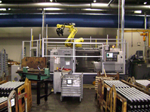7 Manufacturing Trends You Need to Be Aware Of
Posted by
Gosiger on Tue, Jun 18, 2013
 For many years advances in metalworking manufacturing technology centered on increasing throughput and reducing cycle times through faster spindle speeds and feed rates, improved tooling, and the emergence of multi-function CNC machining centers. Today, these factors are taken for granted as ongoing improvements in machine tool performance are expected. The current trends in technology focus less on the machine tools themselves, and more on other aspects of the manufacturing process. Here are some of the more prominent trends we see:
For many years advances in metalworking manufacturing technology centered on increasing throughput and reducing cycle times through faster spindle speeds and feed rates, improved tooling, and the emergence of multi-function CNC machining centers. Today, these factors are taken for granted as ongoing improvements in machine tool performance are expected. The current trends in technology focus less on the machine tools themselves, and more on other aspects of the manufacturing process. Here are some of the more prominent trends we see:
- Increased emphasis on automating the loading of material and unloading parts. Whether you’re machining bar stock or blanks, reducing the involvement of the machine operator saves considerable labor cost and frees the operator to manage multiple machines. Automatic bar feeders safely and reliably load bar stock, while palletized systems and robots can efficiently load and unload even very large and heavy parts.
- Greater demand for agile manufacturing. Many CNC machine shops are asked to perform more short runs, handle large families of parts and quickly adjust to product design and material changes. Additionally, customers expect rapid response to any changes as they struggle to accommodate an increasingly global marketplace. Responding to these demands requires flexible, versatile machine tools and accessories, as well as faster communications between design and production. Mobile devices like smart phones and tablets can help speed communications and enable faster response to customer demands.
- More dependence on information technology. As the need for greater flexibility, precision machining of medical, aerospace and other parts, and cost containment increases, the ability of machine tools to collect and use data during the manufacturing process becomes more important. Advanced machine control systems, such as Okuma’s OSP, use real time data to control the effects of thermal expansion, safeguard against turret crashes, create smarter parts programs and improve and document quality control. Ethernet-based communications systems enable machine tools and peripherals to share data that can manage production schedules and adjust on the fly to prevent material waste and automate changeovers. And remote monitoring of manufacturing processes enable faster corrective actions.
- Lights out manufacturing. To keep up with customer demands many shops need to operate multiple shifts, which can drive up labor costs. However, running an unattended overnight shift is the ultimate labor saving strategy. Unfortunately doing so successfully involves combining a number of automation and monitoring technologies, and it’s not as easy as it sounds. That’s why most shops find it’s a good idea to seek the advice of professionals, like the team at Gosiger Automation, who have a track record of designing and installing lights-out operations.
- Combining technologies. Robotic-based automation now means more than loading and unloading machine tools. Combining vision and sensing technologies with robots enables them to distinguish between part sizes, read barcodes and much more.
- Customers seek solutions, not just new machines. With the demand for agile manufacturing comes the need to quickly adapt to new machining challenges that go beyond machine tools. For example, changes in materials, such as the requirement for no-lead brass in potable water applications, requires an understanding of machine tool capabilities, tooling requirements and the need for controlled, high-pressure coolant delivery. Other manufacturing demands may require automating activities previously handled manually. Gosiger technical specialists work with customers daily to find viable solutions to these challenges.
- A need for better equipment maintenance. As CNC machine shops add more technologically advanced machine tools, automation equipment and accessories, the need for predictive and preventative maintenance increases. Moreover, with customers demanding faster turnarounds and greater agility, equipment failures can create major problems. Plants need planned preventative maintenance programs, either developed internally or provided by a trusted supplier like Gosiger, Inc.
 |